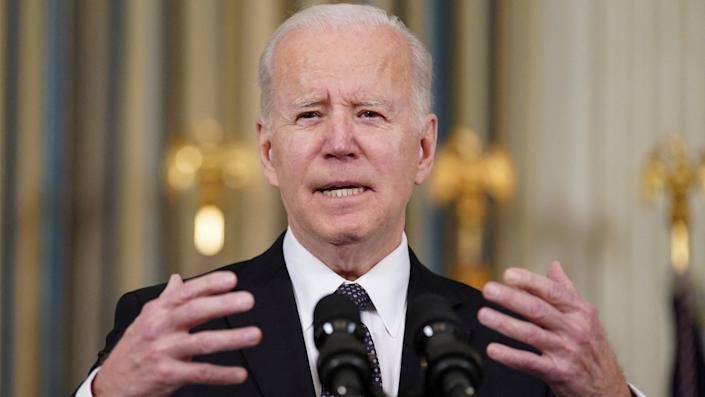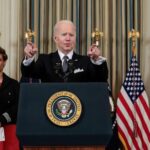WASHINGTON — President Biden used a White House event on Monday to defend, elaborate and qualify comments he made over the weekend in Warsaw, Poland, that seemed to suggest he sought the removal from power of Russian President Vladimir Putin for his invasion of Ukraine.
Those comments, Biden elaborated after two days of controversy, were nothing more than “personal feeling” stemming from “moral outrage,” and the president dismissed concerns that he had exacerbated a situation that some worry could escalate into a broader European war.
“Nobody believes … I was talking about taking down Putin,” the president said, even as he struggled to explain how his personal sentiment should be framed within the context of an international response, which he has led, to Russia’s unprovoked attack on Ukraine late last month.
The controversy was engendered by nine words Biden uttered at the end of his Warsaw speech: “For God’s sake, this man cannot remain in power,” he said of Putin, who has seen no real challenge to his position since becoming Russia’s president two decades ago.
The line had not been part of his prepared remarks, and the White House rushed to explain that Biden was not in favor of removing Putin, who has framed his attack on Ukraine in grievances about the West’s lack of respect for Russia. “The president’s point was that Putin cannot be allowed to exercise power over his neighbors or the region,” an administration official told reporters traveling with the president. “He was not discussing Putin’s power in Russia, or regime change,” the official said in an email.
The controversy over what Biden did or did not mean followed the president back to Washington, where he fielded several questions about the Warsaw speech from reporters at a Monday afternoon event at which he and Office of Management and Budget Director Shalanda Young unveiled the administration’s budget proposal.
“I’m not walking anything back,” he said with a measure of defiance. The charge that he is prone to misstatement has long hounded Biden, so the current tensions with a nuclear superpower have only increased the scrutiny of every word emanating from Washington and Moscow.
By the time he was made to revisit the matter, Biden had already been the recipient of an expected Kremlin rebuke. “That’s not for Biden to decide. The president of Russia is elected by the Russians,” Kremlin spokesman Dmitry Peskov said shortly after the Warsaw speech.
Given how thoroughly Putin has disassembled Russia’s nascent democracy, his electoral success is hardly a reflection of popular support for his policies. To the contrary, protests in Moscow, St. Petersburg and other cities suggest that his invasion of Ukraine enjoys far less support than he may have expected. An initial invasion of Ukraine, in 2014, did not meet with similar outrage either at home or abroad. Nor did a 2008 invasion of Georgia.
“The last part of the speech was talking to the Russian people, telling them what we thought,” Biden said on Monday. Much as the White House would like to see a popular uprising against Putin, there is no chance that an Arab Spring-style revolution could succeed in Russia. Still, the president argued, it was important to tell them — and the rest of the world — that Putin’s aggression is “totally unacceptable.”




